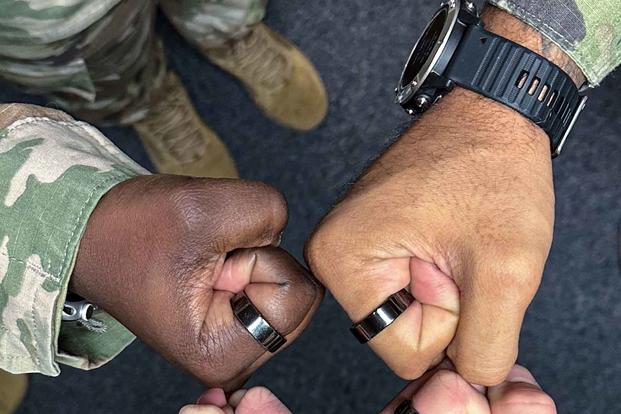The Air Force has distributed wearable smart devices to more than 1,000 first sergeants in an attempt to help some of the most overworked and stressed enlisted members keep track of their health and wellness.
Chief Master Sgt. John Alsvig, the Air Force first sergeant special duty manager, told Military.com in an emailed statement that the First Sergeant Academy early this year began passing out both a smartwatch and a smart ring to each graduate in hopes they'd use them to monitor their vital statistics.
"Some of the metrics being measured include sleep quality, O2 [oxygen] readings and heart rate," Alsvig said. "As we get ready to close out 2023, nearly all wearables have been issued -- with more than 1,000 first sergeants using them."
Read Next: 1 Marine Dead, 14 Injured After Amphibious Combat Vehicle Rollover During Training at Camp Pendleton
First sergeants are responsible for overseeing the health and welfare of the enlisted ranks and conveying their morale, or any issues with it, to commanders.
The Air Force's use of the smart devices comes as the Space Force continues its research into the equipment to possibly replace routine physical fitness tests. It also shows how far the military has come in accepting the technology since 2018, when the Pentagon warned that sensitive data was being broadcast to the public from some wearable devices.
In April, the Pentagon announced that the Defense Innovation Unit, a Defense Department organization designed to help the military make use of emerging technologies, is utilizing wearable fitness devices to help track the early spread of infectious diseases, such as COVID-19, among the ranks.
In that same announcement, the Pentagon said it was also looking at distributing the devices to Air Combat Command's first sergeants.
"Technology has finally produced a product that will increase overall health and wellness to a community of first sergeants who many times prioritize their people ahead of their own health," Air Force Chief Master Sgt. Christopher Gradel, the command chief master sergeant of the 1st Fighter Wing at Joint Base Langley-Eustis, Virginia, said in an April news release.
Just five years ago, wearables such as smartwatches raised major privacy and security concerns throughout the military. A 2018 Pentagon memo asked service members in deployed areas and at high-profile bases not to use their fitness trackers for fear of revealing compromising location data to adversaries.
"The rapidly evolving market of devices, applications and services with geolocation capabilities presents significant risk to DoD personnel both on and off duty, and to our military operations globally," the 2018 memo said.
Alsvig said of the new first sergeant program that the Air Force is "not collecting nor using any of this data for research," adding that "the data is only visible to the user of the device as a tool to monitor their overall well-being."
In May, the Space Force, which is part of the Department of the Air Force, announced it would conduct a two-year testing period with the Air Force Research Laboratory to see how wearable fitness trackers might regularly monitor the fitness and wellness of Guardians.
In August, the service announced that more than 6,000 Garmin smartwatches would be distributed to its Guardians to test how it can use wearable fitness technology for its new fitness program. In 2022, Space Force leaders promised a revolutionary fitness program called the Holistic Health Approach that would use fitness wearables to help track exercise, diet and sleep instead of conducting a physical test like the other services have embraced for decades.
The service said the program will be composed of three elements: the voluntary continuous fitness assessment study, which involves wearable fitness technology; performance health optimization, which includes preventive medicine; and education, which is aimed at teaching Guardians good health habits.
Depending on its success, it could serve as a model for the other services, Garmin said in August.
Related: Thousands of Garmin Smartwatches Being Used to Test Space Force Fitness Program














